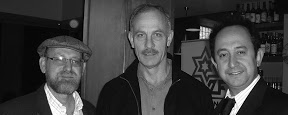 |
| Ben Levitas, chairman SAZF (Cape Council); Chris Eden, national director Bridges for Peace, and Meir Javedanfar, Iranian-Israeli Middle East analyst. |
The president of Iran is “anti-Israel, anti-Semitic and a Holocaust denier, but to judge the people of Iran in this light would be wrong,” said Meir Javedanfar, Iranian-Israeli Middle East analyst, at a breakfast meeting held under the auspices of the South African Zionist Federation (Cape Council) at Café Riteve on 2 June.
“The people want better relations with the West and a democracy, they don’t want Israel to be wiped off the face of the earth,” the Tel Aviv-based expert maintained. He noted that, thanks to President Mahmoud Ahmedinejad, Iranians now knew a lot more about the Holocaust.
“He’s so unpopular that, whatever he says, they want to do the opposite. He denies the Holocaust and suddenly there’s a massive interest in Iran to learn about it — some accuse him of being a ‘closet Jew’,” he said.
Describing the situation in that country as a dictatorship, including extreme abuse of human rights, Javedanfar called on the South African government to intervene. “Your government has got wonderful relations with the government of Iran and is in a good position to help. If it comes from a country such as South Africa … they would take notice. I just wish they’d be a little more forceful.”
South Africa’s failure to do so was putting this country on “the wrong side of history. If there is a revolution in Iran, the people will remember that South Africa didn’t stand up,” he warned. South Africa’s approach to the people of Iran needed to change, both for the sake of human rights and its future foreign relations with the country.
Africa and Israel
Javedanfar claimed that the Iranian government was attempting to increase its influence in Africa to secure votes at the United Nations and fight its isolation there resulting from its nuclear programme and support for terrorism. “This hasn’t been entirely successful, as even the South African government voted for sanctions against Iran at the last round,” he noted. The rogue state also wanted to use Africa as a platform to attack Israeli interests and wished to “turn Africa into a battle against Israel and the United States.”
As for the future for Iran and Israel, Javedanfar opined that the two countries had “tremendous areas of common interest”, claiming that “Iran would be Israel’s best ally. It has also been attacked by Arab nationalists,” he said, alluding to the 1980 Iraqi invasion.
Referring to Israel’s 1981 attack on the Iraqi nuclear reactor, he said the Jewish state had “eliminated a priority threat” for both itself and Iran. “Iranians
have a much more positive attitude to Israel… and I call on the Iranian government to stop the threats against Israel and denying the Holocaust and to establish relations with the State of Israel,” he said.
Turning his attention to ‘Cold War’ between Saudi Arabia (Sunni Muslims) and Iran (Shi’ites), which saw the latter regarded by the former as heretics, he suggested the Iranian leadership should “wake up and see that they’ll never be accepted in the Arab world — that is what makes Iran and Israel natural allies.”
As for Iran’s 10 000 Jews, Javedanfar said they lived “quite well — they just don’t mention Israel. Jews can leave anytime they wish. They can go to Israel — they just don’t say (so) when they come back.”
The Iranian government, he ventured, recalled the Soviet experience in taking on the Jewish community, which had resulted in the American and Jewish communities abroad rallying around, pressurising and sanctioning that country. “I think that’s why Iran has left the Jews alone.”
Javedanfar did not feel that a nuclear Iran would mean the end of Israel, but would bring instability to the Middle East in the form of “much more” support for Hamas and Hezbollah. “The Saudis are much more worried about a nuclear Iran,” he said. “Some of us on the left in Israel feel that the peace process could create a strong front against the Iranians.”
Used with permission of the South African Jewish Report.











